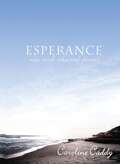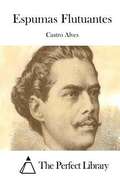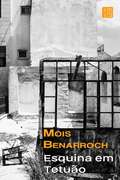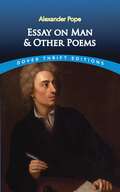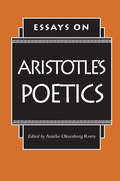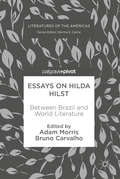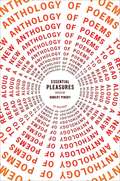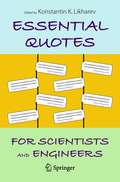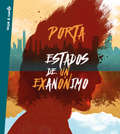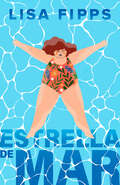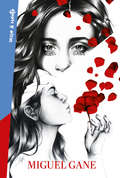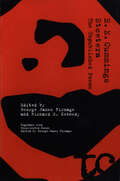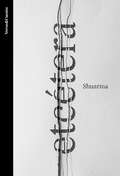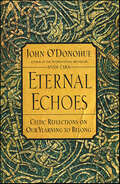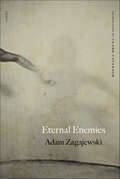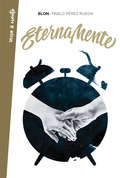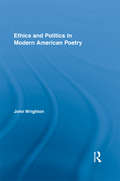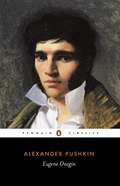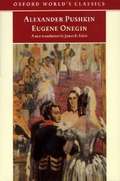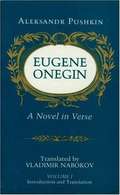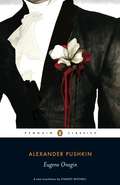- Table View
- List View
Esperance: New and Selected Poems
by Caroline CaddyThis collection of works is culled from the author's first seven books of poetry and contains 17 new poems.
Espumas Flutuantes
by Castro Alves"Espumas Flutuantes" from Castro Alves. Poeta brasileiro (1847-1871).
Esquina em Tetuão
by Mois Benarroch joao batista esteves alvesEsquina em Tetuão de Mois Benarroch Livro de poemas publicado pela editora Esquío, dirigida por Julia Uceda Outros livros do autor disponíveis em português: - 10 poemas (português) (Prêmio Yehuda Amijai 2012) (Portuguese Edition) by Mois Benarroch, translated by Pedro Paixao (Sep 27, 2013) - O Ladrão De Memórias (Portuguese Edition) by Mois Benarroch and Cátia A. G. Fernandes (Feb 18, 2015) - Às Portas de Tânger (Portuguese Edition) by Mois Benarroch and Catia A. G. Fernandes (Aug 24, 2015) Leva-me ao mar (Portuguese Edition) by Mois Benarroch and Maria Olinda Reis (Sep 14, 2015) - Lamentações do imigrante / (Portuguese Edition) by Mois Benarroch and JEAN PIERRE BARAKAT (Sep 14, 2015) - Cachecol Blues / (Portuguese Edition) by Mois Benarroch and Getúlio Maia (Oct 5, 2015)
Essay on Man and Other Poems: And Other Poems (Dover Thrift Editions)
by Alexander PopeConsidered the preeminent verse satirist in English, Alexander Pope (1688-1744) brought wide learning, devastating wit and masterly technique to his poems. Models of clarity and control, they exemplified the classical poetics of the Augustan age.This volume contains a rich selection of Pope's work, including such well-known poems as the title selection — a philosophical meditation on the nature of the universe and man's place in it — and "The Rape of the Lock," a mock-epic of rare charm and skill. Also included are "Ode on Solitude," "The Dying Christian to His Soul," "Elegy to the Memory of an Unfortunate Lady," "An Essay on Criticism," "Epigram Engraved on the Collar of a Dog," "Epistle [IV] to Richard Boyle, Earl of Burlington: Of the Use of Riches," "Epistle to Dr. Arbuthnot; or, Prologue to the Satires" and more.Taken together, these poems offer an excellent sampling of Pope's imaginative genius and the felicitous blending of word, idea and image that earned him a place among the leading lights of 18th-century literature.
Essays on Aristotle's Poetics
by Amélie Oksenberg RortyAimed at deepening our understanding of the Poetics, this collection places Aristotle's analysis of tragedy in its larger philosophical context. In these twenty-one essays, philosophers and classicists explore the corpus of Aristotle's work in order to link the Poetics to the rest of his views on psychology and on history, ethics, and politics. The essays address such topics as catharsis, pity and fear, pleasure, character and the unity of action, and the modality of dramatic action. In addition to the editor, the contributors are Elizabeth Belfiore, Rdiger Bittner, Mary Whitlock Blundell, Wayne Booth, Dorothea Frede, Cynthia Freeland, Leon Golden, Stephen Halliwell, Richard Janko, Aryeh Kosman, Jonathan Lear, Alexander Nehamas, Martha C. Nussbaum, Deborah Roberts, G.E.M. de Ste. Croix, Nancy Sherman, Jean-Pierre Vernant, Stephen A. White, and Paul Woodruff.
Essays on Hilda Hilst: Between Brazil And World Literature (Literatures of the Americas)
by Adam Morris Bruno CarvalhoThis book is the first collection of critical essays on Hilda Hilst (1930-2004) published in English. It brings together a variety of perspectives on one of Latin America’s most inventive and innovative authors. Nine essays by scholars and translators reflect about various aspects of her work, placing it in the context of Brazil and world literature. During her lifetime, Hilst won several major national literary awards and attracted legions of devoted readers. Her writing spanned styles and genres, encompassing poetry, theatre, and experimental fiction. She was also considered to be “a writer’s writer,” and her literary achievements eluded both mainstream acclaim and international recognition. In recent years, Hilst’s books have enjoyed increased visibility in Brazil and beyond. A host of translators (including three contributors to this volume) have finally made some of her masterpieces available in English. This pioneering collection of essays should excite longtime readers and introduce her to a new audience.
Essential Pleasures: A New Anthology of Poems to Read Aloud
by Robert PinskyThis lively, abundant book is distinguished by its focus on hearing poetry read aloud. Robert Pinsky, beloved for his ability to bring poetry to life as spoken language, has collected poems that sound marvelous in a reader's actual or imagined voice. Pinsky has organized the book into sections with brief introductions that emphasize the attentive, intuitive, and reflective process of listening to poetry. This structure provides an implicit, generous definition-by-example of poetry itself: beginning with "Short Lines, Frequent Rhymes" and "Long Lines" and proceeding through fundamental themes such as "Love Poems," "Odes, Complaints, and Celebrations," and "Jokes, Ripostes, Parodies, and Insults." Essential Pleasures gives a fresh setting to traditional favorites, including poems by William Shakespeare, Emily Dickinson, and Robert Frost, placed among contemporary poems by John Ashbery, Louise Gluck, Yusef Komunyakaa, and many others. This is an inviting and distinguished collection and an essential book for every home.
Essential Quotes for Scientists and Engineers
by Konstantin K. LikharevThis book brings together about 2,500 quotations on various topics of interest to scientists and engineers, including students of STEM disciplines. Careful curation of the material by the editor provides the reader with far greater value than can be obtained by searching the internet.The quotes have been selected for various attributes including: importance of topic, depth of insight, and - not least - wit, with many of them satisfying all these criteria. To make sequential reading of the quotes more engaging, they are grouped into broad topical sections, and the entries within each section are organized thematically, forming quasi-continuous narrative threads. The text and authorship of each quote have been carefully verified, and the most popular cases of misquotation and misattribution are noted. The book represents a valuable resource for those writing science and engineering articles as well as being a joy to read in its own right.
Estados de un exanónimo
by PortaPorta, uno de los músicos más influyentes en castellano, debuta en la escritura con Estados de un exanónimo , un libro en el que hace gala de una prosa poética que revisa las pulsiones que nos salvan y nos hieren cada día. «Cuando vuelo el mundo me parece un regalo apasionante y la vida un puzle por completar.»Cuando me dejo llevar me olvido de lo que quiero y dejo que suceda lo que, sin esfuerzo ni angustia, llega a mí.» Lo bueno y lo malo y todos sus grises; y cómo lo afrontamos; y cómo nos refugiamos en ello; y cómo nos condiciona en cada momento. Eso es lo que Porta examina y disecciona con una voz cercana en este libro que consta de cuatro partes, como los estados de ánimo en torno a los cuales nos movemos todos.
Estrella de mar / Starfish
by Lisa Fipps¡Seleccionado como Honor Book por el Premio Printz! Ellie está cansada de que la avergüencen por su peso y decide cambiar eso en esta conmovedora novela en verso, la primera de Lisa Flipps. Desde que Ellie usó un traje de baño de ballena y causó gran revuelo en su fiesta de cumpleaños número 5, ha sido acosada por su peso. Para sobrellevar la situación, trata de vivir según las Reglas de las Chicas Gordas, como “no hacer olas”, “evitar comer en público” y “no moverse tan rápido para que su cuerpo no se mueva”. Ha encontrado su espacio seguro, su piscina, donde se siente ingrávida en un mundo obsesionado con las grasas. En el agua, puede estirarse como una estrella de mar y ocupar todo el espacio que quiera. También es donde puede alejarse de su madre, quien piensa que criticar con insistencia el peso de Ellie la motivará a hacer dieta. Pero Ellie tiene aliados como su padre, su terapeuta y su nueva vecina, Catalina, que ama a Ellie por quien es. Con este apoyo, Ellie finalmente podrá dejar de lado las Reglas de las Chicas Gordas y las estrellas de mar en la vida real, sin disculparse por ser ella misma ni por ser fabulosa.
Estuche Verso&Cuento: Con tal de verte volar | Ahora que ya bailas
by Miguel GaneLa poesía de Miguel Gane nace en la calle, en las historias cotidianas, en la mirada de mujeres valientes. Descubre a este joven poeta si todavía no lo has hecho con sus dos libros en un pack exclusivo. Con tal de verte volar, el primer poemario de Miguel Gane, es un grito, un homenaje a la libertad en su pleno significado. Un conjunto de textos poéticos que reclama las calles como lugar, el rock and roll como banda sonora y la valentía de recuperar la vida después del dolor de un amor tóxico. Una despedida mirando al cielo desde la felicidad de quien deja ir y ama al mismo tiempo. Ahora que ya bailas, el segundo poemario del autor, es la historia de Ella, la que fue callada porque sus gritos resonaban demasiado alto, la que dejó ir su sonrisa porque quien debía liberarla la acabó enjaulando y aplastando contra el asfalto. La que, sola, fue capaz de levantarse, de mirar a la cara a todo eso, y decirle: "No mehas vencido; soy indestructible".
Etcetera: The Unpublished Poems Of E. E. Cummings
by E. E. CummingsA new volume in the Liveright series of Cummings reissues, offset from the authoritative Complete Poems 1904-1962. The poems in Etcetera were discovered in three Cummings manuscript collections and selected from more than 350 unpublished pieces. Many of the poems are from his early years and all convey his freshness and youthful spirit, exhibiting his celebration of love and delight in common natural phenomena. Etcetera was first published by Liveright in 1983. This newly reissued edition is published in a uniform format with Is 5, Tulips & Chimneys, ViVa, XAIPE, and No Thanks.
Etcétera
by ShuarmaEl primer poemario de Shuarma, artista, vocalista de Elefantes y uno de los compositores más populares del panorama pop nacional. «Los textos que componen este libro persiguen la voluntad de alejarte de la realidad, llevarte a otro lugar y sugerirte nuevas visiones, no las mías, sino las que te surjan a ti a través de mis propuestas. Yo enciendo la mecha y tu explotas. Aunque a decir verdad eres tú quien enciende la mecha al decidirte a leer. Siempre comienzas tú». El error es un maestro; crear, la libertad más absoluta. De la magia de lo incompleto, de la sabiduría que se esconde tras la duda y del juego del arte habla este libro. En él, Shuarma -músico, vocalista del célebre grupo Elefantes y artista multidisciplinar- recoge textos que van de lo íntimo a lo lúdico y lo surrealista, que permanecen abiertos a la interpretación, a la espera de que el lector los experimente de una manera única y particular. Una reflexión sobre el poder de la creación y una reivindicación de la misma como acto universal.
Eternal Echoes: Celtic Reflections on Our Yearning to Belong
by John O'DonohueThere is a divine restlessness in the human heart, our eternal echo of longing that lives deep within us and never lets us settle for what we have or where we are.In this exquisitely crafted and inspirational book, John O'Donohue, author of the bestseller Anam Cara, explores the most basic of human desires - the desire to belong, a desire that constantly draws us toward new possibilities of self-discovery, friendship, and creativity.
Eternal Enemies: Poems
by Adam ZagajewskiThe highway became the Red Sea.We moved through the storm like a sheer valley.You drove; I looked at you with love.—from "Storm"One of the most gifted and readable poets of his time, Adam Zagajewski is proving to be a contemporary classic. Few writers in either poetry or prose can be said to have attained the lucid intelligence and limpid economy of style that have become a matter of course with Zagajewski. It is these qualities, combined with his wry humor, gentle skepticism, and perpetual sense of history's dark possibilities, that have earned him a devoted international following. This collection, gracefully translated by Clare Cavanagh, finds the poet reflecting on place, language, and history. Especially moving here are his tributes to writers, friends known in person or in books—people such as Milosz and Sebald, Brodsky and Blake—which intermingle naturally with portraits of family members and loved ones. Eternal Enemies is a luminous meeting of art and everyday life.
Eternamente
by Pablo Pérez RuedaPablo Pérez, más conocido como «Blon», sorprende ahora con su primer poemario, en el que se constata su amor a la palabra con su talento para moldearla. Mi intención no es cambiar el mundo, es que me dejes construir una pequeña parte del tuyo cuando entres por las puertas de mi vida. Yo te regalo el lápiz y una hoja en blanco para que hagas lo mismo con el mío. Lo que creemos juntos no durará siempre, todo se acaba, pero seguirá en el recuerdo eternamente. Te espero apoyado en el horizonte, acomódate, tenemos una larga charla por delante. Reseña:«Entre luces, destellos y sombras, vas a encontrar al poeta que de tanto estar callado aprendió a gritar; que de tanto temer aprendió a amar.»Miguel Gane
Eternamente
by Pablo Pérez Rueda (Blon)Pablo Pérez, más conocido como «Blon», sorprende ahora con su primer poemario, en el que se constata su amor a la palabra con su talento para moldearla. Mi intención no es cambiar el mundo, es que me dejes construir una pequeña parte del tuyo cuando entres por las puertas de mi vida. Yo te regalo el lápiz y una hoja en blanco para que hagas lo mismo con el mío. Lo que creemos juntos no durará siempre, todo se acaba, pero seguirá en el recuerdo eternamente. Te espero apoyado en el horizonte, acomódate, tenemos una larga charla por delante. Reseña:«Entre luces, destellos y sombras, vas a encontrar al poeta que de tanto estar callado aprendió a gritar; que de tanto temer aprendió a amar.»Miguel Gane
Ethics and Enjoyment in Late Medieval Poetry
by Jessica RosenfeldJessica Rosenfeld provides a history of the ethics of medieval vernacular love poetry by tracing its engagement with the late medieval reception of Aristotle. Beginning with a history of the idea of enjoyment from Plato to Peter Abelard and the troubadours, the book then presents a literary and philosophical history of the medieval ethics of love, centered on the legacy of the Roman de la Rose. The chapters reveal that 'courtly love' was scarcely confined to what is often characterized as an ethic of sacrifice and deferral, but also engaged with Aristotelian ideas about pleasure and earthly happiness. Readings of Machaut, Froissart, Chaucer, Dante, Deguileville and Langland show that poets were often markedly aware of the overlapping ethical languages of philosophy and erotic poetry. The study's conclusion places medieval poetry and philosophy in the context of psychoanalytic ethics, and argues for a re-evaluation of Lacan's ideas about courtly love.
Ethics and Politics in Modern American Poetry (Literary Criticism and Cultural Theory)
by John WrightonFrom the Objectivists to e-poetry, this thoughtful and innovative book explores the dynamic relationship between the ethical imperative and poetic practice, revitalizing the study of the most prominent post-war American poets in a fresh, provocative way. Contributing to the "turn to ethics" in literary studies, the book begins with Emmanual Levinas’ philosophy, proposing that his reorientation of ontology and ethics demands a social responsibility. In poetic practice this responsibility for the other, it is argued, is both responsive to the traumatized semiotics of our shared language and directed towards an emancipatory social activism. Individual chapters deal with Charles Olson’s The Maximus Poems (including reproductions of previously unpublished archive material), Gary Snyder’s environmental poetry, Allen Ginsberg’s Beat poetics, Jerome Rothenberg’s ethnopoetics, and Bruce Andrew’s Language poetry. Following the book’s chronological and contextual approach, their work is situated within a constellation of poetic schools and movements, and in relation to the shifting socio-political conditions of post-war America. In its redefinition and extension of the key notion of "poethics" and, as guide to the development of experimental work in modern American poetry, this book will interest and appeal to a wide audience.
Etymology and the Invention of English in Early Modern Literature
by Hannah CrawforthHow did authors such as Jonson, Spenser, Donne and Milton think about the past lives of the words they used? Hannah Crawforth shows how early modern writers were acutely attuned to the religious and political implications of the etymology of English words. She argues that these lexically astute writers actively engaged with the lexicographers, Anglo-Saxonists and etymologists who were carrying out a national project to recover, or invent, the origins of English, at a time when the question of a national vernacular was inseparable from that of national identity. English words are deployed to particular effect – as a polemical weapon, allegorical device, coded form of communication, type of historical allusion or political tool. Drawing together early modern literature and linguistics, Crawforth argues that the history of English as it was studied in the period radically underpins the writing of its greatest poets.
Eucharist and the Poetic Imagination in Early Modern England
by Sophie ReadThe Reformation changed forever how the sacrament of the Eucharist was understood. This study of six canonical early modern lyric poets traces the literary afterlife of what was one of the greatest doctrinal shifts in English history. Sophie Read argues that the move from a literal to a figurative understanding of the phrase 'this is my body' exerted a powerful imaginative pull on successive generations. To illustrate this, she examines in detail the work of Southwell, Donne, Herbert, Crashaw, Vaughan and Milton, who between them represent a broad range of doctrinal and confessional positions, from the Jesuit Southwell to Milton's heterodox Puritanism. Individually, each chapter examines how Eucharistic ideas are expressed through a particular rhetorical trope; together, they illuminate the continued importance of the Eucharist's transformation well into the seventeenth century - not simply as a matter of doctrine, but as a rhetorical and poetic mode.
Eugene Onegin
by Alexander PushkinThis novel in verse, said to be the parent of all Russian novels, is a tragic story of innocence, love and friendship. Eugene Onegin, an aristocrat, much like Pushkin and his peers in his attitude and habits, is bored. He visits the countryside where the young and passionate Tatyana falls in love with him. In a touching letter she confesses her love but is cruelly rejected. Years later, it is Onegin's turn to be rejected by Tatyana.
Eugene Onegin: A Novel in Verse
by Alexander Pushkin James E. FalenEugene Onegin is the master work of the poet whom Russians regard as the fountainhead of their literature. Set in 1820s Russia, Pushkin's verse novel follows the fates of three men and three women. Engaging, full of suspense, and varied in tone, it also portrays a large cast of other characters and offers the reader many literary, philosophical, and autobiographical digressions, often in a highly satirical vein. Eugene Onegin was Pushkin's own favorite work, and this new translation conveys the literal sense and the poetic music of the original. About the Series: For over 100 years Oxford World's Classics has made available the broadest spectrum of literature from around the globe. Each affordable volume reflects Oxford's commitment to scholarship, providing the most accurate text plus a wealth of other valuable features, including expert introductions by leading authorities, voluminous notes to clarify the text, up-to-date bibliographies for further study, and much more.
Eugene Onegin: A Novel in Verse
by Alexander Pushkin Vladimir Nabokov"In an era of inept and ignorant imitations, whose piped-in background music has hypnotized innocent readers into fearing literality's salutary jolt, some reviewers were upset by the humble fidelity of my version. . . . " Such was Vladimir Nabokov's response to the storm of controversy aroused by the first edition of his literal translation of Eugene Onegin. This bold rendering of the Russian masterpiece, together with Nabokov's detailed and witty commentary, is itself a work of enduring literary interest, and reflects a lifelong admiration for Pushkin on the part of one of this century's most brilliant stylists.
Eugene Onegin: A Novel in Verse
by Alexander PushkinEugene Onegin is the master work of the poet whom Russians regard as the fountainhead of their literature. Set in 1820s Russia, Pushkin's verse novel follows the fates of three men and three women. Engaging, full of suspense, and varied in tone, it contains a large cast of characters and offers the reader many literary, philosophical, and autobiographical digressions, often in a highly satirical vein. Eugene Onegin was Pushkin's own favourite work, and this new translation by Stanley Mitchell conveys the literal sense and the poetic music of the original.
